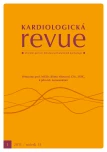New findings in antiaggregation treatment for ESC 2010
Authors:
J. Špác
Published in:
Kardiol Rev Int Med 2011, 13(1): 59-61
Category:
Congress Reports
Overview
Attention at last year’s European Cardiological Congress in the field of antiaggregation treatment was chiefly focused on improving the effectiveness of treatment and reduction of risk for patients. A number of papers focused on the influencing of treatment through the incidence of genetic polymorphisms during clopidogrel treatment, drug interactions between proton pump inhibitors and clopidogrel. The clinical results of the second-phase study in the field of new drug groups were presented for thrombin inhibitors, as they were for non-thienopyridine antiaggregational substances, e.g. elinogrel. The question of how best to monitor antiaggregation treatment – either through the monitoring of pharmacological effects or the monitoring of an individual’s genetic make-up – remained unresolved for the time being.
Keywords:
antiaggregation treatment – acute coronary syndromes
Sources
1. Trenk D, Hochholzer W, Fromm MF et al. Cytochrome P450 2C19 681G>A Polymorphism and High On-Clopidogrel Platelet Reactivity Associated With Adverse 1-Year Clinical Outcome of Elective Percutaneous Coronary Intervention With Drug-Eluting or Bare-Metal Stents. J Am Coll Cardiol 2008; 51 : 1925–1934.
2. Wallentin L, James S, Storey RF et al. PLATO investigators. Effect of CYP2C19 and ABCB1 single nucleotide polymorphisms on outcomes of treatment with ticagrelor versus clopidogrel for acute coronary syndromes: a genetic substudy of the PLATO trial. Lancet 2010; 376 : 1320–1328.
3. Paré G, Mehta SR, Yusuf S et al. Effects of CYP2C19 genotype on clopidogrel treatment in CURE and ACTIVE. N Eng J Med 2010; 363 : 1704–1714.
4. Bhatt DL, Cryer BL, Contant CF et al. COGENT Investigators. Clopidogrel with or without Omeprazole in Coronary Artery Disease. N Engl J Med 2010; 363: 1909–1917.
5. Simon T, Verstuyft C, Mary-Krause M et al. French Registry of Acute ST-Elevation and Non-ST-Elevation Myocardial Infarction (FAST-MI) Investigators. Genetic determinants of response to clopidogrel and cardiovascular events. N Engl J Med 2009; 360 : 363–375.
6. Abraham NS, Hlatky MA, Antman EM et al. American College of Cardiology Foundation Task Force on Expert Consensus Documents. ACCF/ACG/AHA 2010 Expert Consensus Document on the Concomitant Use of Proton Pump Inhibitors and Thienopyridines: A Focused Update of the ACCF/ACG/AHA 2008 Expert Consensus Document on Reducing the Gastrointestinal Risks of Antiplatelet Therapy and NSAID Use. J Am Coll Cardiol 2010; 56 : 2051–2066.
7. Geisler T et al. Impact of inflammatory markers on platelet function and cardiovascular outcome in patiens undergoing coronary intervention. ESC 2010.
8. Rao S. The INNOVATE PCI investigators. A randomized, double-blind, active controlled trial to evaluate intravenous and oral PRT060128 (elinogrel), a selective and reversible P2Y12 receptor inhibitor vs clopidogrel as a novel antiplatelet therapy in patients undergoing nonurgent percutaneous coronary interventions. European Society of Cardiology 2010 Congress; 2010; August 30, 2010; Stockholm, Sweden.
Labels
Paediatric cardiology Internal medicine Cardiac surgery CardiologyArticle was published in
Cardiology Review

2011 Issue 1
-
All articles in this issue
- Medicamentous treatment of pulmonary hypertension in 2011
- Patients on heart transplant waiting list – results
- TOR inhibitors following heart transplant
- Compatibility index: does this apply to patients following a heart transplant?
- Mechanical ventricular support devices in heart failure treatment
- New findings in antiaggregation treatment for ESC 2010
- Latent obstruction in outflow tract of left ventricle in patient with hypertrophic cardiomyopathy
- Treatment of hypertension in obese patients
- Fixed combinations for arterial hypertension
- Kidneys and acute coronary syndrome
- Cardiogenic shock
- The importance of heart rate modulation in patients with cardiac failure
- Is the prognosis of congestive heart failure patients still so bad?
- Cardiology Review
- Journal archive
- Current issue
- About the journal
Most read in this issue
- Cardiogenic shock
- Is the prognosis of congestive heart failure patients still so bad?
- Mechanical ventricular support devices in heart failure treatment
- Latent obstruction in outflow tract of left ventricle in patient with hypertrophic cardiomyopathy
